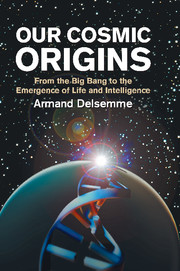Book contents
- Frontmatter
- Contents
- Foreword
- Preface
- Acknowledgments
- 1 Locating humans in the Universe
- 2 The race toward complexity
- 3 The stellar alchemy of metals
- 4 The formation of the planets
- 5 The emergence of life
- 6 The history of life
- 7 The awakening of intelligence
- 8 The other worlds
- 9 Perspectives
- APPENDIX A The standard model of the physics of elementary particles
- APPENDIX B Symmetry in physics
- APPENDIX C The strange role of time in relativity
- APPENDIX D The measurement of long time spans and the age of the Universe
- APPENDIX E The standard model of the Big Bang
- APPENDIX F The cause of the Big Bang and inflation
- APPENDIX G Chirality
- Glossary
- Bibliography
- Figure index
- Table index
- Name index
- Subject index
Foreword
Published online by Cambridge University Press: 05 August 2012
- Frontmatter
- Contents
- Foreword
- Preface
- Acknowledgments
- 1 Locating humans in the Universe
- 2 The race toward complexity
- 3 The stellar alchemy of metals
- 4 The formation of the planets
- 5 The emergence of life
- 6 The history of life
- 7 The awakening of intelligence
- 8 The other worlds
- 9 Perspectives
- APPENDIX A The standard model of the physics of elementary particles
- APPENDIX B Symmetry in physics
- APPENDIX C The strange role of time in relativity
- APPENDIX D The measurement of long time spans and the age of the Universe
- APPENDIX E The standard model of the Big Bang
- APPENDIX F The cause of the Big Bang and inflation
- APPENDIX G Chirality
- Glossary
- Bibliography
- Figure index
- Table index
- Name index
- Subject index
Summary
From the Big Bang to the human brain, it has taken the universe some fifteen billion years of cosmic, physical, chemical, and biological evolution to reach a stage where, on our own little speck of dust, it is beginning to look into itself and ponder its origin, nature, and significance.
How did it all happen? What is known, suspected, or assumed of each of the steps whereby time and matter first arose out of nothing, elementary particles condensed out of the original plasma, and, out of them, in turn, the atoms of the various elements came to be? Of the steps whereby galaxies were born, spawning billions of stars, many probably surrounded by planetary systems? Of the steps whereby, on one particular planet, which happened to combine a special set of physical conditions, life emerged and evolved, finally leading to conscious, thinking beings?
How much of this extraordinary history is due to deterministic forces, how much to chance? Did it happen only once? Or does the cosmos contain many planets that have given rise to life, perhaps even to intelligent life? What is it about the cosmological constants that endows our universe with its unique properties? Is only one such universe possible? Or are there many universes, of which ours happens to bear life and mind, and thus to be knowable, because of a special combination of cosmological constants? What triggered the Big Bang? A creative act of God? Or just randomly fluctuating nothingness?
- Type
- Chapter
- Information
- Our Cosmic OriginsFrom the Big Bang to the Emergence of Life and Intelligence, pp. xiii - xivPublisher: Cambridge University PressPrint publication year: 1998

